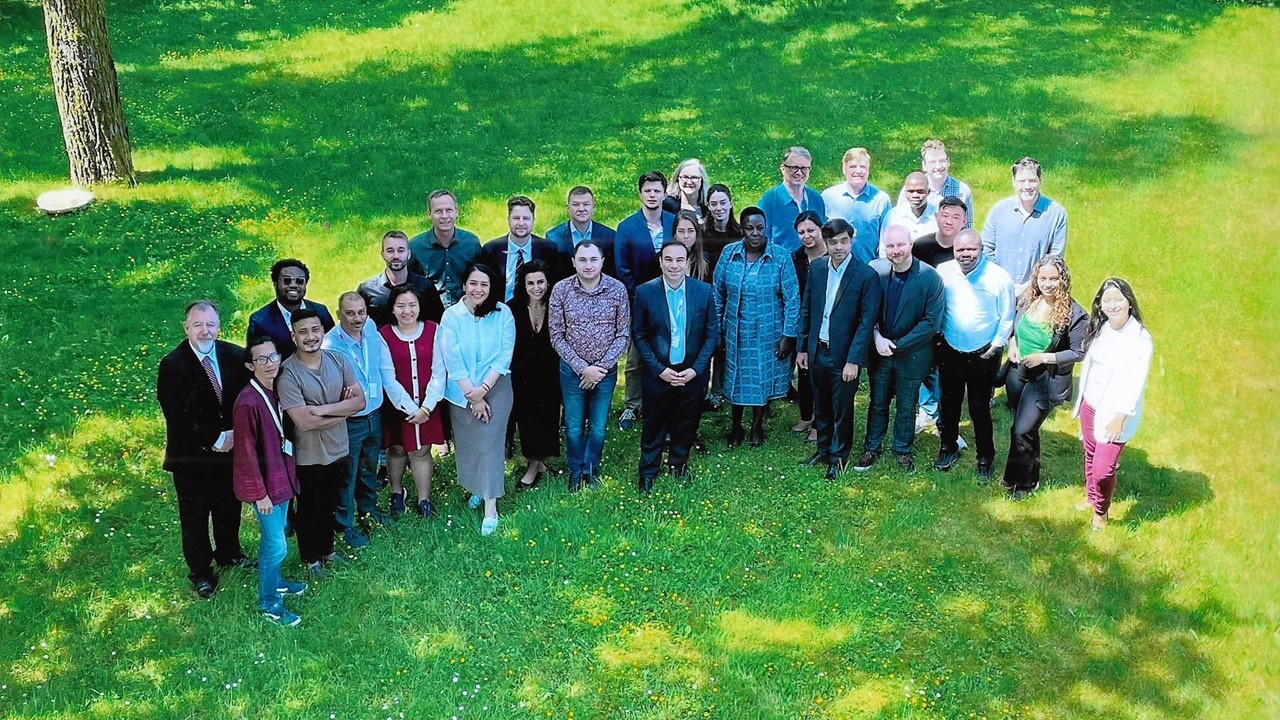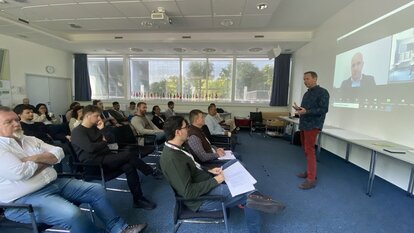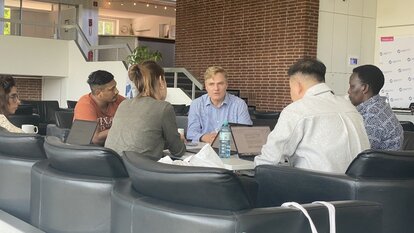International Academy for Leadership
How Does the Market Economy Respond to the Challenges of Sustainable Development?

Participants in the IAF Seminar "The Future of the Market Economy: Challenges and Threats," 28 May - 9 June 2023.
Criticism of the market economy is not entirely new. Since Karl Marx, the market economy, or capitalism in the terms given by Marx, has been criticized as an economic system that is exploitative and will eventually destroy itself. Even some of those who claim to be liberal today also accuse the market economy of being responsible for economic inequality and environmental damage. The economy, critics say, demands government intervention to address what they call "market failures."
The Covid pandemic seems to provide additional ammunition for critics. The panic response of market players to the extraordinary and sudden health crisis seems to have paved the way for greater government intervention and expansion. The credibility of the market economy is being tested today when calls for big, centralized, and interventionist governments are increasingly being voiced in many countries. Does the market economy still have a future?
Presumably, this situation is the background for the Friedrich Naumann Foundation (FNF) to raise the theme “The Future of the Market Economy: Challenges and Threats” at the International Academy for Leadership (IAF) seminar in Germany, 28 May-9 June 2023. Thanks to FNF Indonesia's full support, I, representing Institut Demokrasi dan Kesejahteraan Sosial (INDEKS), was one of 24 participants from various countries who were fortunate to be able to attend this seminar with a very challenging theme.
The seminar explored how the market economy has played an essential role in the advancement of our world today. Furthermore, the seminar identified unresolved problems and solutions offered by private business actors compared to those in government.
In the learning process in the seminar room at Theodor Heuss Akademie, Gummersbach, participants received material input and discussed with several experts, namely Tom Palmer (Atlas Network, United States of America/USA), Andrew Morriss (Texas A&M University, USA), Nima Sanandaji (European Center for Entrepreneurship and Policy Reform, Sweden), and Gerhard Dust (Polycare Research Technology, Germany). In addition, participants received enrichment through field visits to business and government institutions in Cologne, Mainz, Morbach and Frankfurt.
The seminar was hosted by three highly competent and experienced facilitators, namely Rainer Heufers (Center for Indonesian Policy Studies, Indonesia), Arpita Nepal (Samridhi Foundation, Nepal), and Samar Eissa (a financial advisor for startups at the Investment Authority of Egypt).
The Market Economy and Its Role in the Progress of Our World
In his introductory presentation, Rainer Heufers raised a phenomenon known as the “German miracle,” namely how the Germany's economy grew very rapidly from a state of chaos shortly after World War II ended.
Due to the "war economy" practiced by the Hitler regime and the aftermath of the war, the German economy in the early post-World War II years was marked by paralyzed businesses, food shortages, soaring unemployment, and the depreciation of the Reichsmark currency. But soon the "miracle" happened. Businesses revived, food returned to the market, and the unemployment rate, which had soared to about 11% in the 1950s, dropped precipitously to 1% in the 1960s.
Rainer explained that Germany's economic "miracle" was the result of major economic reforms under Ludwig Erhard, Minister of Economy of the post-World War II Federal Republic of Germany. Apart from ending the excessive supply of money and reforming the currency, Erhard also restored the market mechanism by removing price controls. These reforms were welcomed positively by market players, thereby encouraging an increase in economic productivity and national income growth of 108% in 1950-1960.
The reunification of West Germany and East Germany again made the German economy slump once again. However, Rainer said, the German government's economic reforms through, among other things, deregulation, redesigning unemployment benefits and reducing non-wage labor costs re-created the "magic", this time even bringing Germany to become the strongest economy in Europe.
It is the operation of the market economy system that, according to Rainer, explains the German economic "miracle". But what exactly is meant by a market economy?
The term "market economy" refers to an unplanned economic system, not coordinated by a central authority, but solely by conditions of supply and demand. A market economy is characterized by private ownership of the means of production, voluntary exchange among economic actors, and prices that are shaped by the relationship between supply and demand. The opposite of a market economy is a planned economy, in which the government owns the factors of production and determines when, where, and how much of a good or service is produced. In a planned economy, prices are not formed naturally based on market mechanisms, but are determined by the government.
According to Arpita Nepal, with reference to the Economic Freedom Index indicator released by several institutions, a market economy has basic characteristics such as a limited government role in the economy, a legal system that protects private property rights, efficient business regulation, and an open market. Countries with freer markets tend to excel in economic and societal well-being compared to countries with more government intervention in markets.

Rainer Heufers (standing) facilitating an online discussion session on the Nordic Model with speaker Nima Sanandaji from the European Center for Entrepreneurship, Sweden.
The market economy plays a role in economic and social progress in the Nordic countries, namely Denmark, Finland, Iceland, Norway, and Sweden. Some people think that the Nordic countries achieved economic and social progress because they practiced socialism. However, Nima Sanandaji, speaker from the European Center for Entrepreneurship and Policy Reform, Sweden, said this was a misunderstanding. The market economy is deeply rooted in the Nordic countries. Long before they became Welfare States, the Nordic countries had made substantive progress economically and socially by practicing a market economy. Sweden did experiment with socialism in 1970-1990, but failed. And now, all the Nordic countries have moved back towards a market economy with greater economic freedom.
Whether measured by standards of health, education, economy, and so on, humans today are in better living conditions than ever before. This progress did not happen by accident, but rather the result of the institutionalization of a market economy system that has optimized human capacity to create, innovate, and cooperate in fulfilling their ever-evolving needs.
Morality and Market Economy Responses to Humanitarian and Environmental Issues
From a moral point of view, said Tom Palmer of Atlas Network, the market economy is based on the recognition and respect for human dignity. In a market economy, individuals are seen as free moral agents pursuing their personal interests based on their rights to themselves and their property. This does not mean the market is completely unregulated. According to Tom, an unregulated market is nothing but a myth. The existence of law and the rule of law is necessary to provide legal protection for individuals for themselves, the property they own, and contracts and economic transactions that they carry out voluntarily.

Tom Palmer, speaker from Atlas Network, in an interview session with one of the participant groups.
In other words, as explored by Andrew Morriss from Texas A&M University, what is needed are laws that protect the rights and freedoms of market participants and perfect market functions in fulfilling human needs. Legal certainty is needed to protect private property ownership, freedom of contract, compensation for losses, freedom of business, and so on. According to Morris, individual rights must take precedence over the legislative process.
As an economic system based on freedom, the market economy is not only effective in creating prosperity, but also in solving human problems. The principles of a market economy—rule of law, limited government, efficient regulation, and open markets—provide incentives for everyone to find and provide goods and services that are useful for meeting the needs of others, while pursuing their own economic interests. .
When the earthquake rocked Haiti in 2010, for example, emergency humanitarian assistance was needed, but could not be applied in the long term. In this regard, Gerhard Dust, founder and CEO of Polycare Research Technology, demonstrated that a market-based approach—which departs from real needs on the ground—could offer a more sustainable solution in providing permanent housing needs for earthquake-affected residents in Haiti.
Utilizing mostly local materials, Polycare Research Technology responded to these residential needs with construction technology whose method resembles the assembly of Lego blocks. In the case of the 2010 Haiti earthquake, the use of this technology was not only practical, fast, and required little training to apply to those with no prior experience in construction, but also used environmentally friendly materials. Furthermore, these technologies are continuously evolving and becoming more environmentally friendly, at competitive costs compared to conventional approaches.
The role of the market economy in offering solutions to environmental problems is also evident in the business model of igus, a company that produces polymers for what it calls motion plastics. The company, headquartered in Cologne, recycles plastic waste to produce polymer products in the form of energy chains, cables, non-lubricated bearings, and so on which can be customized for application in various industries. Everything is produced without a carbon footprint.
Before becoming a leading global polymer producer, igus was only a small-medium business founded in 1964. The well-maintained institutionalization of the market economy in Germany, said Hans Stein of Zenith, provides incentives for igus entrepreneurs to innovate developing products their products are based on the dynamics of consumer needs, while continuing to increase their commitment to environmental sustainability.
The Future of the Market Economy
The economic process presupposes the existence of a market as a landscape where the demand for goods and services is confronted with the availability of supply. In the market, people meet each other's needs by exchanging the valuable goods and services they produce. Markets support economic processes.
Markets, of course, aren't perfect, but so are governments. Market participants are encouraged to pursue their own interests, but so do policymakers in government institutions. Some market players are fraudulent and greedy, the same characteristics are also found in state officials. Various contemporary problems that arise in economic and social life need to be addressed carefully rather than rushing to blame the market while blindly believing in government policies.
In fact, as seen in countries that practice communism or extreme socialism, the failure of governments and their planned economies has more dire consequences than what is often referred to as “market failure.” This happens because the government's economic role—which is claimed to fulfill public needs—cannot be free from preferential bias that benefits crony groups close to political power and is carried out by force through regulation and often weapons.
On the other hand, whether measured by standards of health, education, economy, and so on, humanity today is in better living conditions than ever before. This progress did not happen by accident, but rather the result of the institutional market economic system which has optimized human capacity to create, innovate, and cooperate voluntarily in fulfilling their ever-evolving needs.
Referring to the black-and-white understanding of textbooks, there is indeed no country today that implements a market economy wholly or, conversely, is wholly controlled by the government. However, whether a country tends towards a market economy or a planned economy can be seen from its level of economic freedom, namely legal guarantees for private ownership, restrictions on the size and role of the government's economy, efficient business regulation, and open and competitive market processes.
Looking at the trend of development of world economic freedom, it is clear that, in the long run, the global community tends to place greater trust in the market economic system than in an economy driven by political commands. The government will be encouraged to play a role in improving market performance fulfilling various societal needs and responding to contemporary issues of sustainable development.
---------
Written by Nanang Sunandar, Executive Director of Institut Demokrasi dan Kesejahteraan Sosial (INDEKS).
